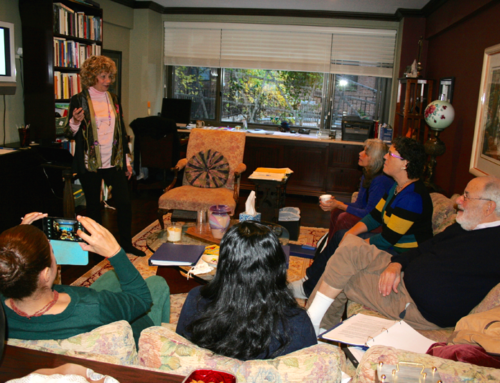On December 18, 2012 the NY Times reported a story plugging the value of art. (http://www.nytimes.com/2012/12/19/arts/design/arts-as-antidote-for-academic-ills.html?_r=0) It told of the artist, Chuck Close, who had spoken to a group of elementary school children about how art “saved his life.” As a child he was limited by neurological disabilities which made it difficult if not impossible to perform commensurate with his intelligence. He became a famous artist because of his limits. He told the children that limitations are important.
Infertility seems to limit many things beyond the difficulty of enlarging your family. But limitations can become important if you do what Chuck Close did: “…figure out what
So if you’re in a fertility quest, even as you do everything in your power to conceive, you don’t have the capacity to “legislate” getting the family that you so yearn for. You feel alienated from your friends who are in the mainstream, popping out babies left and right. You don’t feel connected to the life you once knew. You feel overpowered by the onslaught of stress in your life.
Procreation is the most profound form of creation. Yet, art, or creativity of any kind, can be a life-saver when struggling with infertility (or any adversity, for that matter). To put mental energy into creativity at a time when the goal is to create new life is a very powerful analogue—and coping mechanism. It is “what’s left” that you can make work for you. Women or couples with whom I have worked over the years have invested creative energy into things like refurbishing a fixer-upper. Two women started blogs, one for fashion and the other for cooking. Participating in or just enjoying music or any arts or crafts can provide absorption into an infertility-free zone. Any endeavor that can distract from infertility’s frenzy opens a space to shift perspective toward joy, which has a way of getting lost.
I heard a fascinating story on Public Radio’s Weekend Edition a while back that is another example of working with what’s left. It was about a project in which inner city kids in Los Angles were paid to come to a class on Shakespeare. Their “job,” which gave focus and joy to their lives, was to understand what Shakespeare was saying and to re-imagine his work so it could feel relevant to their lives. Teachers guided them through Shakespeare’s “foreign” language to the meaning of his plays, sonnets, and other works. The kids teamed up or worked on their own to create a song, poem, rap or other work of art. These were collected on a CD called “Urban Shakespeare.” The consensus of the participants was about how empowered they felt at what they had created. Empowerment is the perfect antidote to helplessness. Helplessness is a universal feeling when dealing with infertility.
The interviewer in this story was Christine Anthony. Mary Beth Kirchner, director of education in Los Angeles, spoke with Christine about the Shakespeare project. What Christine said was memorable: “War pumps up the need to create. The opposite of war is art.” Inner city kids feel as if they are at war. And so do infertility patients. Infertility patients all use the same language to describe this experience: in the heat of battle, trench warfare, war zone, battleground and the like. Art is the opposite of war.
There’s an artist of sorts in all of us. Find your inner artist and give him/her expression and you’ll be working with ‘what’s left,” as Chuck Close did. This is an antidote to this temporary war. If you can use creativity to cope with the built-in challenges of infertility, you can turn a red light to green and get your life moving toward joy while you wait for the miracle.
©January 2013
Helen Adrienne, LCSW, BCD






